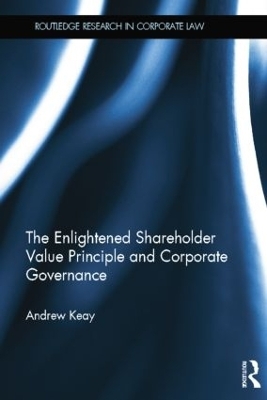
The Enlightened Shareholder Value Principle and Corporate Governance
Seiten
2014
Routledge (Verlag)
978-1-138-02522-6 (ISBN)
Routledge (Verlag)
978-1-138-02522-6 (ISBN)
The enlightened shareholder value principle (ESV) was formulated during the comprehensive review of UK company law by the Company Law Steering Group in the late 1990s and early 2000’s and requires directors of companies to act in the collective best interests of shareholders. The principle was taken up by the then UK Government and is now embedded in the Companies Act 2006. The emergence of the principle constitutes an important development in corporate governance, particularly in determining what directors must consider when managing the affairs of their companies.
This book explains and analyzes the nature of ESV and its contribution to corporate governance whilst also examining where it fits into the existing theoretical landscape. Andrew Keay traces the development of the principle of ESV and considers it in the context of the existing principles which have historically influenced corporate governance. In doing so, the book draws on several empirical studies thereby enabling us to gauge how the ESV principle is addressed in commercial practice. Keay goes on to compare ESV with the constituency statutes that apply in the US in order to determine whether anything can be learnt from the American experience. The book also assesses the reaction of other jurisdictions to the advent of ESV and considers what impact ESV will have on financial institutions and non-financial institutions in the aftermath of the global financial crisis.
This book explains and analyzes the nature of ESV and its contribution to corporate governance whilst also examining where it fits into the existing theoretical landscape. Andrew Keay traces the development of the principle of ESV and considers it in the context of the existing principles which have historically influenced corporate governance. In doing so, the book draws on several empirical studies thereby enabling us to gauge how the ESV principle is addressed in commercial practice. Keay goes on to compare ESV with the constituency statutes that apply in the US in order to determine whether anything can be learnt from the American experience. The book also assesses the reaction of other jurisdictions to the advent of ESV and considers what impact ESV will have on financial institutions and non-financial institutions in the aftermath of the global financial crisis.
Andrew Keay is Professor of Corporate and Commercial Law at the University of Leeds. He is also a barrister-at-law at Kings Chambers. Andrew is a specialist in corporate law and insolvency law. He recently authored the influential book, The Corporate Objective (Edward Elgar, 2011).
1. Introduction 2. The Theoretical Background 3. The Development of ESV 4. The Duty to Promote the Success of the Company : An Analysis of Section 172 of the Companies Act 2006 5. The Business Review: An Analysis of Section 417 of the Companies Act 2006 6. Constituency Statutes 7. An Evaluation of Enlightened Shareholder Value and its Impact 8. The Future 9. Epilogue
| Erscheint lt. Verlag | 14.3.2014 |
|---|---|
| Reihe/Serie | Routledge Research in Corporate Law |
| Verlagsort | London |
| Sprache | englisch |
| Maße | 156 x 234 mm |
| Gewicht | 544 g |
| Themenwelt | Recht / Steuern ► Allgemeines / Lexika |
| Recht / Steuern ► EU / Internationales Recht | |
| Recht / Steuern ► Wirtschaftsrecht ► Gesellschaftsrecht | |
| Wirtschaft ► Betriebswirtschaft / Management | |
| Wirtschaft ► Volkswirtschaftslehre | |
| ISBN-10 | 1-138-02522-4 / 1138025224 |
| ISBN-13 | 978-1-138-02522-6 / 9781138025226 |
| Zustand | Neuware |
| Haben Sie eine Frage zum Produkt? |
Mehr entdecken
aus dem Bereich
aus dem Bereich
Kommentar
Buch | Hardcover (2024)
C.H.Beck (Verlag)
CHF 306,55


